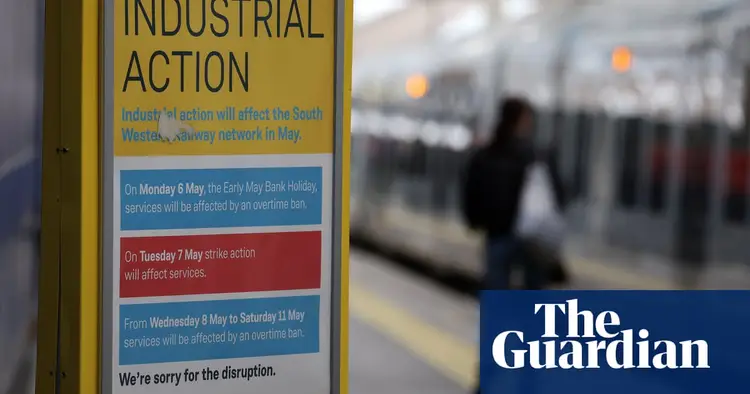Train strikes to halt most trains in south-east England on Tuesday

On Tuesday, numerous trains will not be operating throughout the south-east region of England. This includes significant commuter routes for travelers in and out of London. The reason for the disruption is that train drivers are initiating a series of rolling strikes over three days at rail operators across the country.
Train operators across England will experience a 24-hour strike from Tuesday to Thursday as drivers who are members of the Aslef union continue their ongoing overtime ban that began on Monday. This industrial action is centered around a disagreement regarding pay and has been ongoing for a significant period of time.
Train passengers should check their journey before departing, as the overtime ban is leading to further inconvenience and less frequent timetables in several areas across the country where rail companies rely on voluntary work to provide certain services.
During the strike days, the majority of operators will not operate any trains. As a result, certain services that cross the Wales and Scotland borders may be impacted later in the week.
The individuals who travel to the city for work will experience the largest impact due to the strike taking place on Tuesday. The strike will interrupt all transportation services on c2c, Great Northern, and Gatwick Express. Additionally, there will only be a small number of trains operating on specific routes provided by Greater Anglia, Thameslink, Southeastern, Southern, and South Western.
Train companies have advised individuals to refrain from traveling unless it is truly essential. A consortium representing businesses in the city, BusinessLDN, has mentioned that the strikes' repercussions will be "even more keenly felt by many" because of the shortened workweek following the Monday bank holiday.
The upcoming Wednesday there will be a strike from drivers that will last for 24 hours. As a result, many trains that operate across long distances will be affected, including those that go to Wales and Scotland, as well as those in the Midlands. The train companies that will be impacted are Avanti West Coast, Chiltern Railways, CrossCountry, East Midlands Railway, Great Western Railway, and West Midlands Trains.
There are no plans to have any other trains running besides GWR, but their service will be very limited. Additionally, the drivers who work at Heathrow Express will participate in a strike which will cause their schedule to be reduced by half. However, the trains on the Elizabeth line that travel to the airport will still be in operation.
A large portion of the northern areas will be impacted on Thursday as Northern and TransPennine Express will not be operating any trains. Additionally, LNER - which operates travel routes between London, the north-eastern regions of England and Scotland - will only be providing a restricted service.
Expect some disturbance in transportation during the days surrounding the operator's 24-hour strike, and the overtime prohibition will persist till this Saturday's conclusion.
According to Aslef, drivers will keep going on strike for a better pay deal, because some of them have not received a salary increase in the last five years.
A year ago, negotiations between Aslef and the train operating companies failed due to Aslef turning down an offer that was considered laughable. However, there was a recent attempt by the industry to restart talks. The Rail Delivery Group (RDG) contacted union leaders through email, hoping to come to a mutually agreeable solution and commence official negotiations.
Mick Whelan, the general secretary of Aslef, expressed his approval of the approach and is willing to participate. However, the government tightly regulates its contracted operators and has made it clear multiple times that they are not planning to renegotiate the pay increase.
The Aslef union has been carrying out rolling strikes for the fourth week in a row. This follows a change in their approach to the ongoing dispute that has lasted nearly two years. In February, it was decided by the train drivers to continue with the striking action with an overwhelming majority vote.
According to Whelan who spoke to the Guardian, they said: "We've been at this for 22 months, and we have limited options. We either take action or do nothing at all. Our members have expressed their desire for us to keep working towards a solution, and that's precisely what we will do."
Suppose we halt our work tomorrow, does it imply that we have gone through another five years without a salary hike? We are not responsible for this circumstance. The government chose to harm the industry, pick on the trade unions needlessly, and introduce reforms that do not benefit the commuters, taxpayers, or the employees in this sector.
According to a representative of RDG, the railway will suffer more harm if the strikes take place. The industry is currently obtaining an additional subsidy of about £50m per week from the government due to the decrease in revenues caused by Covid.









































